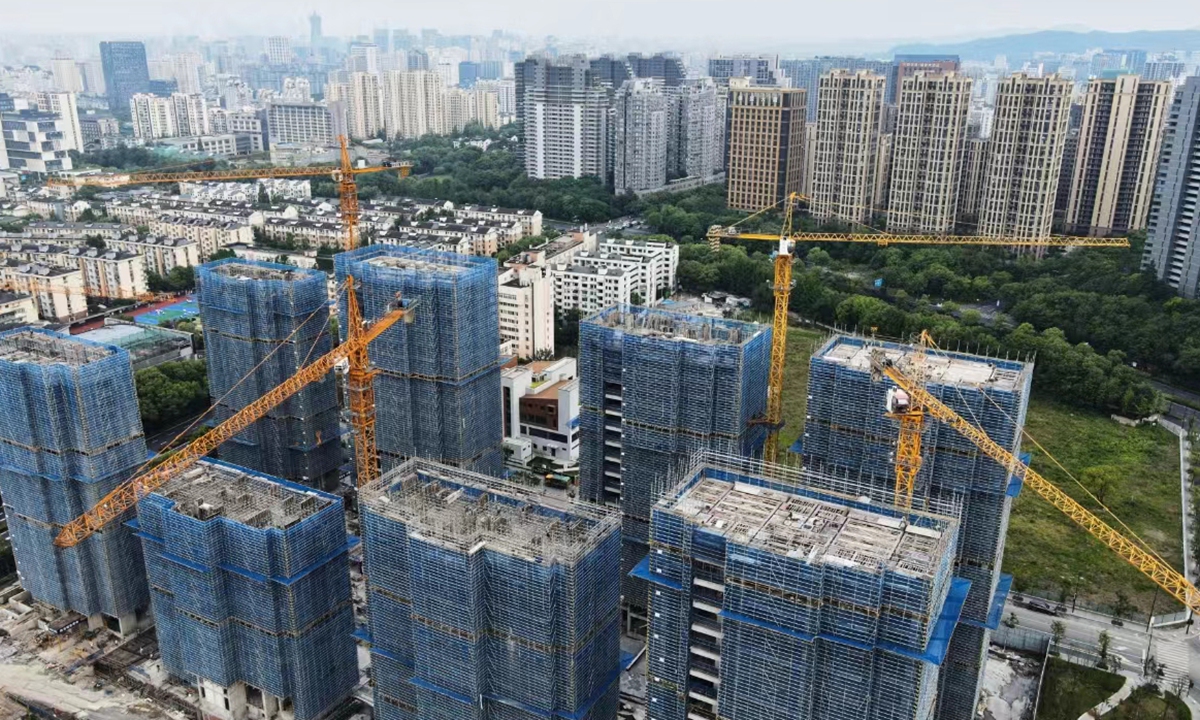
A view of a residential property project under construction in Hangzhou, East China's Zhejiang Province. File photo: VCG
New home prices rose faster in November, the transaction volume of new housing and second-hand housing purchases increased, and a number of other indicators improved, demonstrating the effectiveness of a string of policies aimed at boosting China's property market. More pro-growth policies continue to be implemented to further support the real estate industry, with the reduction in property deed tax, one of the latest incentive policies, taking effect on Sunday.
The national real estate market has entered a good stage of stabilization and reversed its downturn, which fully shows that the current series of policies is accurate and effective, Yan Yuejin, research director at Shanghai-based E-house China R&D Institute, told the Global Times on Sunday.
New home prices in 100 cities rose by 0.36 percent in November on a monthly basis, up from a month-on-month growth of 0.29 percent in October. The year-on-year growth expanded from 2.08 percent in October to 2.40 percent in November, according to the latest statistics released by domestic real estate research institution China Index Academy on its official WeChat.
In November, the sales area of new homes in 30 key cities increased by 12.4 percent month-on-month, an increase of 20.6 percent year-on-year. The number of second-hand housing transactions in 20 key cities increased by 11.7 percent month-on-month, an increase of 26.3 percent year-on-year, according to data released by the China Index Academy on Sunday.
Among them, Shenzhen, one of the four first-tier cities in China, saw the transaction volume double year-on-year in new and second-hand housing.
Total presales of new homes registered in Shenzhen stood at 8,076 units in November, up 94.5 percent month-on-month, the second highest in four years, media reported on Sunday, citing data from Leyoujia, a Shenzhen-based real estate firm.
Meanwhile, the registered second-hand residential housing sales in Shenzhen stood at 7,125 units in November, up 16.5 percent month-on-month, the highest in nearly four years, according to Leyoujia data.
In addition to the growth in house sales, home prices also saw an increase in big cities. In November, new home prices rose 0.69 percent month-on-month in the first-tier cities of Beijing, Shanghai, Guangzhou and Shenzhen, while rising 0.33 percent month-on-month in second-tier cities, according to data from China Index Academy.
"House purchasers' confidence gradually increased with the stabilization and increase in house prices. Essential housing needs and improvement in housing conditions will also be strengthened after a slew of policies," Yan said.
One of the latest policies was an increased incentive in terms of property deed tax, which took effect on Sunday.
Individuals purchasing their only residential property or a second home, as long as the area does not exceed 140 square meters, will pay deed tax at a rate of 1 percent across the country. For properties with an area exceeding 140 square meters, the deed tax will be levied at a rate of 1.5 percent, according to a notice released by the Ministry of Finance, the State Tax Administration and the Ministry of Housing and Urban-Rural Development in mid-November.
"At present, I have more than 10 purchase order intentions in hand. Purchasers are waiting for the implementation of the new deed tax policy to go through the property registration procedures," a broker surnamed Wei at a Beijing branch of domestic real estate agency 5i5j told the Global Times on Sunday, adding that transactions are mainly for second-hand housing.
Yan said that people who want to buy a house in November are likely to wait until the policy is implemented before they register the purchase.
"Therefore, there will be an obvious surge in the purchase volume of the property market in December. In general, policies like the reduction in deed tax will have a very positive effect on the market trading in December this year and in the following year," said Yan.
Buyers planning to buy a second home in the first-tier cities will benefit the most from the revised deed tax, as the previous tax rate in the four first-tier cities was 3 percent, Zhang Dawei, chief analyst with real estate agency Centaline Property, said in a statement.
"Following a key Party meeting at the end of September, which officially set the goal of stabilizing the property market and reversing its downturn, various supportive policies for the real estate industry have been implemented. This has led to the most relaxed environment for real estate sales in over a decade," said Yan, exemplifying the relaxed purchase restrictions, as well as the historic low down payment ratio and loan interest rates.




